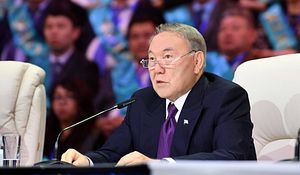On December 28, Kazakh President Nursultan Nazarbayev approved a series of amendments to the country’s media law that have the potential to further impede media freedoms in the country.
As AFP reported last week, the changes include requiring that journalists receive permission from persons mentioned in their articles before publishing “personal, family, medical, banking, commercial [information] and other legally protected secrets.”
Another amendment prohibits anonymous commenting, requiring individuals to register their identities with the government before posting comments on news websites. The government says people will still be able to post under nicknames, but that it would retain their identity data for three months.
The passage of the law by both houses of Kazakhstan’s parliament and Nazarbayev’s quick signature marks the end of a process that began on a much more hopeful tone.
As Reporters Without Borders (RSF) notes in a release condemning the amendments, Astana’s initial announcement that it would amend the country’s media law was greeted positively. Hopes were raised further when Astana consulted journalists about the changes, “as this is not customary in Kazakhstan,” RSF says.
But, the media watchdog notes, “these amendments will just make things worse.”
“Far from the announced intentions, this package of amendments obstructs the activities of journalists even more and makes them more vulnerable to pressure,” Johann Bihr, the head of RSF’s Eastern Europe and Central Asia desk, said.
For example, the amendment requiring journalists to obtain an individual’s permission before publishing information that could be classified as being of a personal, family, medical, banking, or commercial nature more than hamstrings investigative journalism — it has the potential to kill it entirely.
As RSF points out, “Kazakh law already protects the right to privacy and medical confidentiality, among others,” but the “new form of confidentiality” in the amendments is undefined, “opening the way to the broadest possible interpretation.”
Investigations into corrupt government figures often ends up delving into their personal and financial matters — their offshore bank accounts, yachts, Paris flats, etc — and such accountability reporting which takes aim at those on high has always been a risky endeavor. Now it may be even more so.
Kazakhstan has a history of loosely interpreting its own vague legal terms. Article 174 is perfect illustration of this. Article 174 of the Kazakh criminal code outlaws actions aimed at inciting “social, national, generic, racial, class or religious hatred” as well as the “insult of the national honor and dignity or religious feelings of citizens” and “propaganda of exclusivity, superiority or inferiority of citizens on grounds of their relation to religion, class, national, generic or racial assignment.”
In recent years, Kazakhs have been sentenced to three years in a penal colony for insulting Putin on Facebook; two years of restricted freedom for publishing pamphlets with inflammatory language regarding the Chinese; three years in prison for posting alleged excerpts of an unpublished book written by a religious figure on Facebook. These are just a handful of cases but serve to underscore how Kazakhstan’s authorities are accustomed to interpreting the country’s laws broadly when needed.
The two cases noted above in which Facebook posts were the medium of the “crime” underscore how problematic the other controversial amendment noted above may be in practice. Individuals have been thrown in jail for Facebook comments in Kazakhstan, so those with criticisms to air may try to hide behind a fake name. The new law makes that even more difficult.
Kazakhstan’s amendment regarding anonymous commenters mirrors a law China passed last August.
Kazakhstan landed in the 157th spot (out of 180) in RSF’s 2017 World Press Freedom index. China came in at 176th. Judging from the new amendments signed into law by Nazarbayev, we can guess which direction Astana is moving in.
































